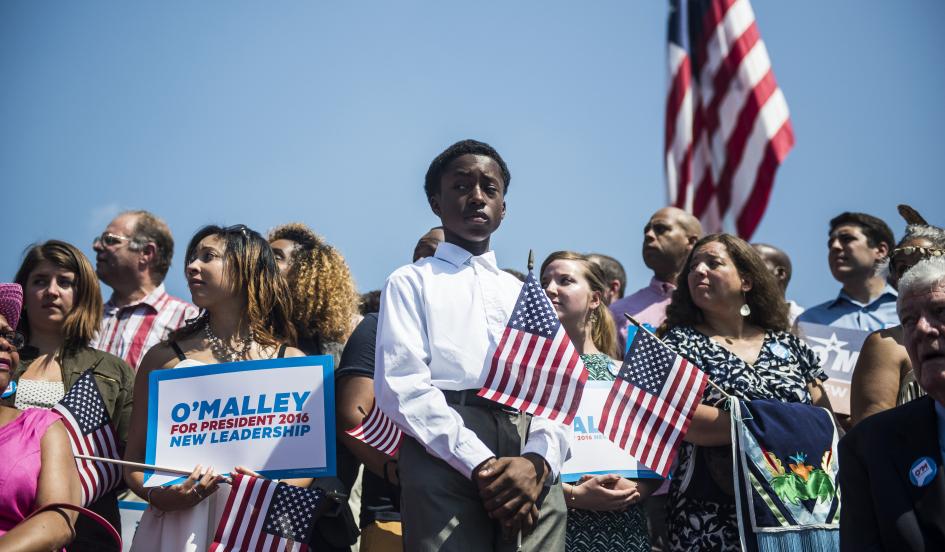
The headline on the front page of The Washington Post’s September 15, 1999, late edition was startlingly politically incorrect: “White Man Gets Mayoral Nomination in Baltimore.” Martin O’Malley had defeated two African-American candidates, and thanks to Baltimore’s heavily Democratic makeup (roughly 90 percent of registered voters), he went on to become the rare white mayor of a majority-black city.
The headline provoked an outcry, and the Post quickly rewrote it, apologizing for having “distorted the role of race in the election.” Perhaps it did, but that headline continues to define O’Malley’s career as a politician who knows how to get black votes. After all, he attracted nearly a third of Baltimore’s black voters that year and a sizable majority of them four years later. After his two terms as mayor, O’Malley served two terms as governor of Maryland, beginning in 2007 and ending in January of this year. That state is a good proving ground for a candidate’s ability to garner black support, since it is over 30 percent black, one of the highest concentrations of African-Americans in the country.
Complaints of Brutality
ayoral Nomination in Baltimore.” Martin O’Malley had defeated two African-American candidates, and thanks to Baltimore’s heavily Democratic makeup (roughly 90 percent of registered voters), he went on to become the rare white mayor of a majority-black city.
The headline provoked an outcry, and the Post quickly rewrote it, apologizing for having “distorted the role of race in the election.” Perhaps it did, but that headline continues to define O’Malley’s career as a politician who knows how to get black votes. After all, he attracted nearly a third of Baltimore’s black voters that year and a sizable majority of them four years later. After his two terms as mayor, O’Malley served two terms as governor of Maryland, beginning in 2007 and ending in January of this year. That state is a good proving ground for a candidate’s ability to garner black support, since it is over 30 percent black, one of the highest concentrations of African-Americans in the country.
Scourge of Hopelessness
It’s hard to say how O’Malley, who launched his presidential campaign May 30, will do with black voters in 2016, since he’s still nearly invisible outside Maryland, barely registering in Democratic surveys. In South Carolina, an early voting state with a large African-American population, a poll from the Democratic-leaning firm Public Policy Polling earlier this year pegged his support at just 3 percent, and he earned the backing of only 4 percent of black Democrats (versus 60 percent for Clinton).
And in these early days of the campaign, it’s been Clinton who’s making a direct appeal to the black community, primarily on criminal justice and voting rights. O’Malley has acknowledged the need for some criminal justice reforms, like requiring police to wear body cameras, but in his campaign launch speech last month, he denied that the riots in Baltimore were primarily about race. The “scourge of hopelessness that happened to ignite here that evening transcends race or geography,” O’Malley insisted. Baltimore’s woes, he seemed to imply, were the product of national currents, rather than a reflection of his eight years as mayor.
And therein lies the rub for O’Malley. Police brutality—the issue that has ignited a new generation of civil rights activists—is where his record will be most problematic for black voters. Critics now blame O’Malley’s zero-tolerance policies for heightening tensions that led to Freddie Gray’s death in police custody this spring, sparking days of protest. Even when O’Malley was mayor, it complicated his ties with the black community, creating what The Baltimore Sun described as a “sometimes-rocky relationship.” Now that racist policing is in the spotlight, O’Malley’s critics can hammer him in the pages of The Washington Post and nightly on MSNBC.
His defense was and continues to be that the policies were necessary to lower Baltimore’s staggering crime rate, something black voters at the time said was a top priority. But the steep drop in crime in the U.S., to its lowest level in decades, has made that crime-fighting record far less salient and those tactics less defensible for today’s black voters.
O’Malley backers point to other justice issues where he lined up with the black community, such as restoring voting rights for convicted felons and his effort as governor to abolish Maryland’s death penalty, which Benjamin Jealous, the former president of the NAACP, calls “the institutional extension of lynching.” Jealous says it was brave of O’Malley to take the stand: “Courage in defense of civil rights and human rights has resonance in the black community. Always has, always will.”
The O’Malley campaign plans to unveil an urban agenda in the coming months that, judging by his emphasis thus far, will focus heavily on the economy and inequality. But given the near-constant video streams documenting police brutality from across the nation, black voters are going to expect him to address his role not only in lowering crime but also in promoting a type of policing now intertwined with the spate of black male deaths.
O’Malley’s critics aren’t keeping quiet. “I think the Baltimore citizens are going to be loud about their comments about his years in Baltimore,” says Stokes. “It’s going to just get louder if he was to advance beyond his 1 or 2 percent.”
That said, O’Malley has his backers. Even one of his most strenuous critics, The Wire creator David Simon, says if the former Maryland governor were to win the Democratic nomination for president, he'd have Simon's vote, thanks to other liberal policies like abolishing the death penalty and legalizing gay marriage. And given the fidelity of African-Americans to the Democratic Party, O'Malley would no doubt win the majority of their votes versus a Republican opponent.
Correction: O'Malley won first race for Maryland governor in 2006 with a 7 percent margin of victory, not a 1 percent margin.
- Publish my comments...
- 0 Comments
